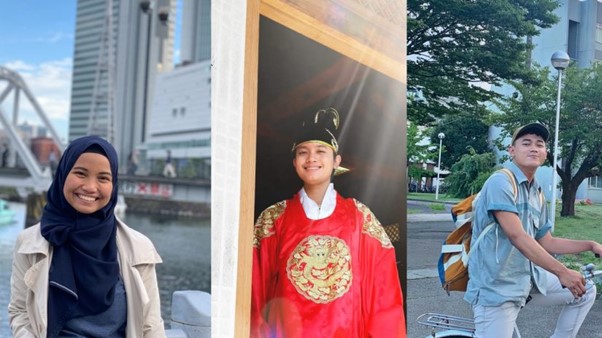
Three Microbiology students from the class of 2019, had the opportunity to take part in student exchanges through the AIMS or ASEAN International Mobility Students Program. Robertus Hudy Utomo is an Agricultural Microbiology student who participated in a student exchange at one of the universities in the country of K-Pop, Gyeongsang National University. Hudy chose this university because he wanted to improve his competence. Not only that, according to him, South Korea can provide great opportunities for foreign students who can contribute to their country. After graduating from his undergraduate course, Hudy hopes to continue studying armed with the experience he has gained from this student exchange.
Another student who got the opportunity to do a student exchange is Melodia Rezadhini, who is familiarly known as Melo. Melo participated in a student exchange program at one of the top universities in Japan, at the Tokyo University of Agriculture and Technology (TUAT) which focuses on studying agriculture and mechanical engineering. The time frame for Melo to take part in this program is approximately 4 months, starting from 11 September 2022 to 16 December 2022. Choosing TUAT as the place for her study abroad, Melo hopes that the opportunity to get scholarships to study abroad will be more open, as well as enrich her experiences abroad.
The last student who got the opportunity to do a student exchange was Pradipta Guntur Putra, who had the opportunity to take part in a student exchange program at Ibaraki University in Japan. By participating in this program, Dipta hopes that it can be used as a stepping stone to realizing his dream of working and living in Japan. Ibaraki University itself was chosen because the program offered was in line with the period of study he was currently undertaking. The program offered is a research-based program that already has a main topic. Dipta, who is a final-year student who will soon be doing research as a graduation requirement, feels suitable and interested in joining the program. In addition, information from seniors who had previously attended a similar program at the university and with the same professor made Dipta more interested in joining the program.
When participating in the study abroad program held by AIMS, there are a series of selection processes that must be followed. In the first stage of selection, there is a selection of files, such as portfolios, CVs, grade transcripts that have been translated by academics, a minimum TOEFL of 500 or IELTS which can be prepared in advance because the validity period is approximately 6 months, permission letters must be signed by DPA and parents, motivation letters, and statement letters. At first, selection was done to select files such as motivation letters. After passing the selection, an interview was conducted which was tested by the lecturer or person in charge of AIMS at the Faculty of Agriculture UGM this year, including Mrs. Arini Wahyu Utami, Ph.D. from the Department of Social Economy, Pak Nur Akbar Arofatullah, S.P., M.Biotech., Ph.D. from the Department of Agricultural Microbiology, and Miss Ni Nyoman Indriyani from the Secretariat of the Faculty of Agriculture. After passing the filing and interview process, several people were finally selected to take part in the study abroad. Selected persons must complete administrative arrangements for departure, such as vaccines, VISA for passports, and other forms.
Hudy, Melo, and Dipta also giving tips for fellow students who want to do student exchange. The first tip is to believe in yourself. With self-confidence, it will be easier to undertake all challenges in the future because of this self-confidence. The second tip is don’t be afraid to try when the opportunity comes. Therefore, you must have the courage to take the opportunities that exist. The third is about mastery of foreign languages, especially English as an international language to interact in conducting learning in the exchange of students you want to join. The third is to increase portfolios, abilities, and cumulative grade points for non-academic activities that can be achieved according to each ability. These things can be used to make a motivation letter that can explain who we are and the abilities we have. The last is increasing insight by reading or watching videos that can understand and expand information in the international world. Hudy, Melo, and Dipta also added important tips, namely preparing everything well in advance by seeking information, asking seniors and friends who have attended a study abroad and have experience in participating in similar programs.
